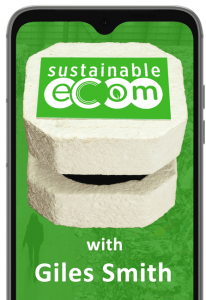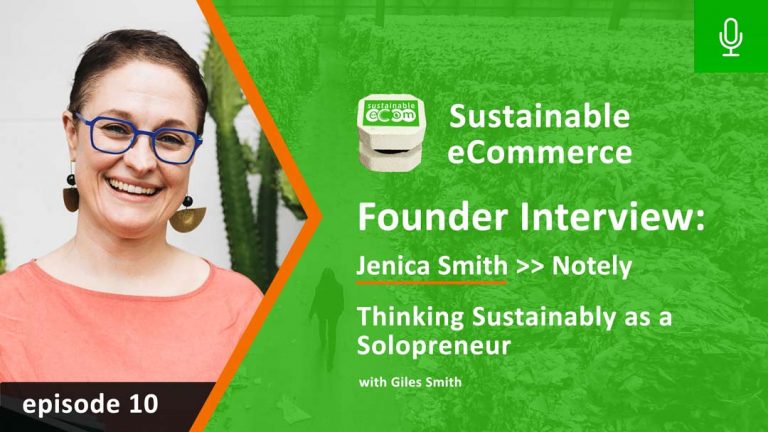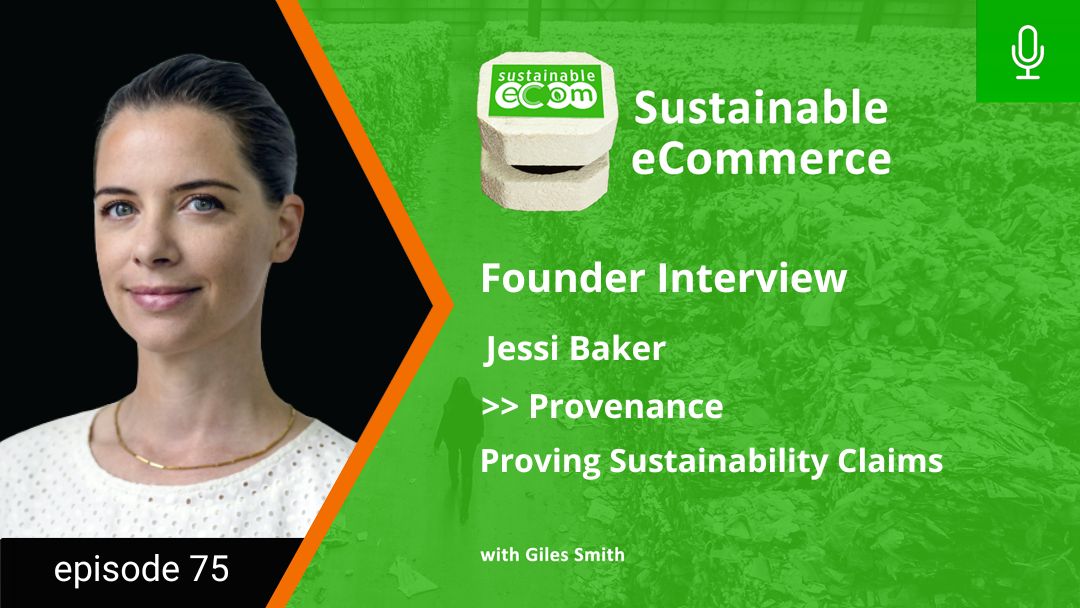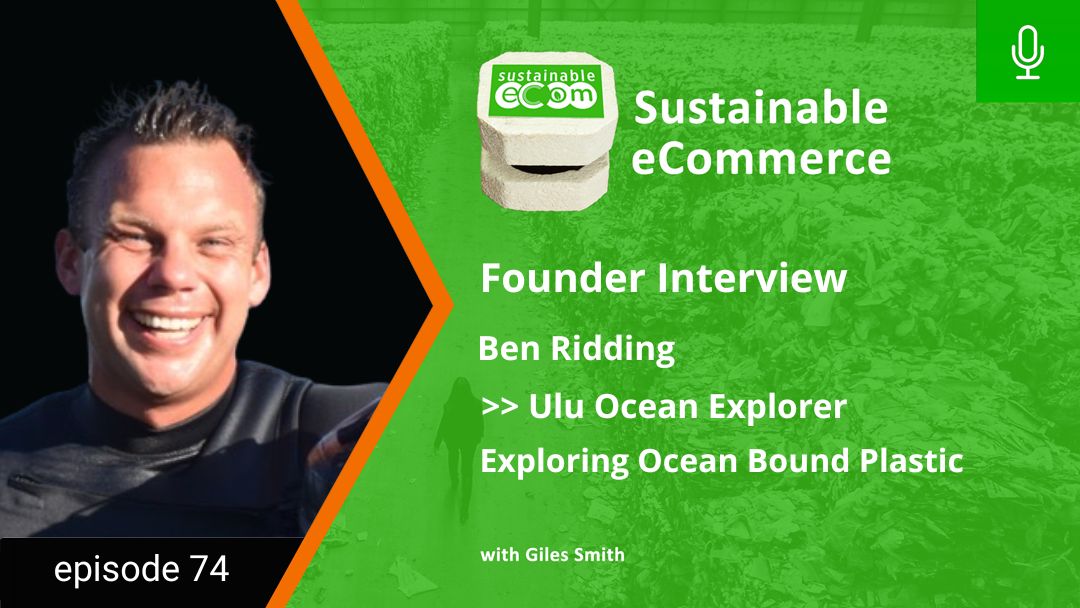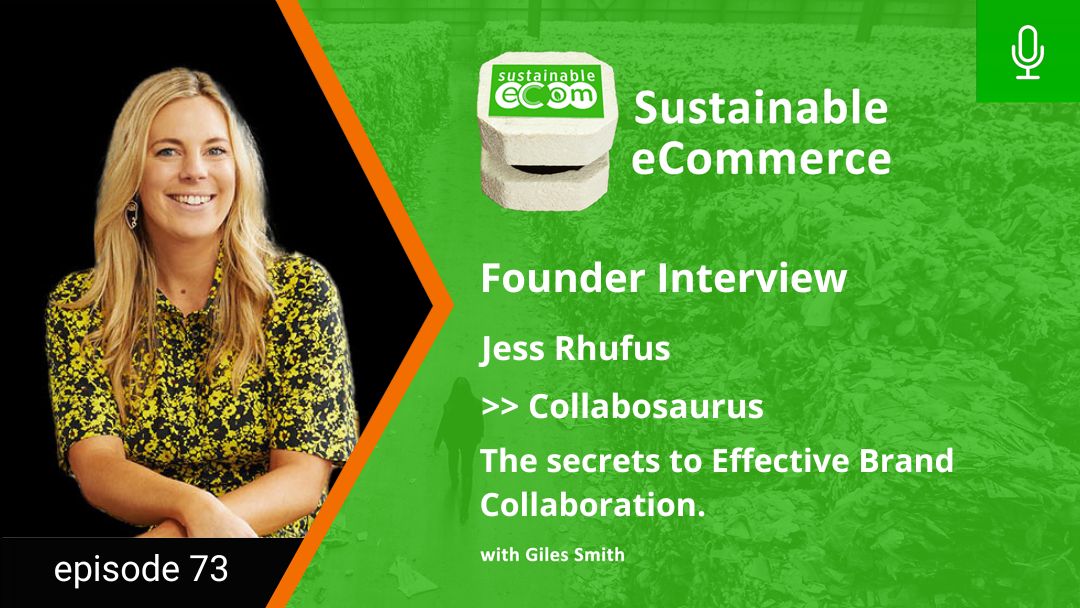Welcome to Episode 10 of the Sustainable eCommerce Podcast!
Today I’m joined by Jenica Smith founder of Notely, a niche brand making giftcards and notebooks from recycled paper and coffee cups.
Notely is not a gigantic brand, yet Jenica chooses to make thoughtful decisions all through the operations of her business, from manufacturing right through to order fulfilment, and has a beautifully authentic approach to transparency.
We chat a bit about there realities of life as a solopreneur and the value of building a network of like minded business owners.
Its hard not to love this honest, true blue Aussie entrepreneur

Giles Smith: To start out, tell us a little bit about you. Where did you grow up and how did you come to start Notely?
Jenica Smith: Well, I've been a graphic designer for the past 20 years, so I've always kind of been into print. Maybe a decade ago now I really wanted to reconnect with the creative community in Brisbane. Back in 2010 I started a blog called Design Montage, where I started interviewing lots of artists and featuring a lot of local talent. And then it kind of grew & got this crazy traction where I was featuring lots of artists from interstate as well. After a couple of years of doing it, I just really burned out because I was still working as a graphic designer full time and was running this blog all hours of the day. But that ignited my love for digital and building a community of people online based around the creative industry.
After a couple of years, I took time out to reassess and really wanted to get back to basics. It was during that time that I realised there were not many options for eco-friendly stationery. It seemed like if you wanted to get a nice notebook, you've got to go to the big-name chains, which is mostly overseas product. I wondered if there was a way I could feature all the artists, build their profile and create a really beautiful product that we're just really proud of. And that was the origins of Notely. A couple of my artist friends helped me form my first collection for the range back in 2014.
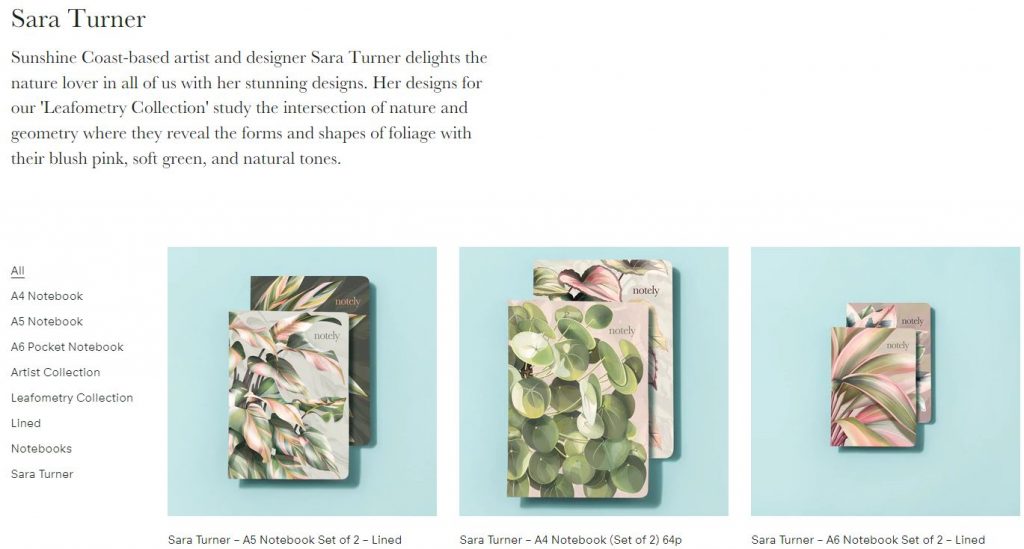
Giles Smith: Oh, congratulations! That’s great inspiration for anyone building a business which is to build a community first and then figure out what to sell them. It's a genius way to do! So tell us more about Notely’s range today.
Jenica Smith: So today we've got really strong artists collections, and each year we try to add one or two new artists into the range to grow that collection. We also try to bring in a new style of artwork each year. As an artist, I’ve probably always hidden behind the talent of the artists in my community, but with Notely I’ve started to put my own stamp on the direction. We’ve focused a bit more on Australian natives and that's the undercurrent of the main artists collections now with featured artists in different styles.
Giles Smith: I do love the breadth of the range you've got. The artwork makes for beautiful notebooks that really stand out.
Tell us a little bit about your journey to choosing the materials. You mentioned there wasn't very many good sustainable alternatives in the art supplies space. You're using FSC certified recycled paper for your notebooks and art paper, which is cool. I think most people's understanding of recycled paper is it's kind of grainy, not very nice to feel and possibly wouldn't make a great substrate to write on or to do artwork on. So tell us about that journey and how did you choose the best source?
Jenica Smith: Well through working in corporate graphic design, I was often coming across lots of different types of papers from suppliers, which were beautiful surfaces. And the technology was increasing where there were better, types of papers from recycled content. Often it's the whitest office paper that's recycled. So that means you don't not need to use bleachers and fluorines and stuff to make it white, because it’s already white. I was doing my research into what papers were available, and discovered that the recycled content has a really lovely toothy feel compared to virgin sheets that might be quite smooth. So it has that feel of a beautiful notebook, but the paper itself is quite white, so the artwork is still very vibrant.
Not all of the range is completely recycled. Some of our colored card stocks are FSC- Certified from well-managed forest mixed with recycled.
Giles Smith: Perfect, yes. One of the darker sides of recycled paper, particularly when you're looking for that kind of diamond white finish is that it can be associated with some of the nasty chemical processes to get it that way. So, you're saying that you've managed to select suppliers and paper pulp stock that's come from white office paper. You haven't had to introduce all that chemical processing.
Jenica Smith: Yes and one other thing that’s been really popular in our range is our cup notes range, a big percentage of which is made from recycled takeaway coffee cups. It works out that for each set of two notebooks, you're saving one takeaway coffee cup from landfill.
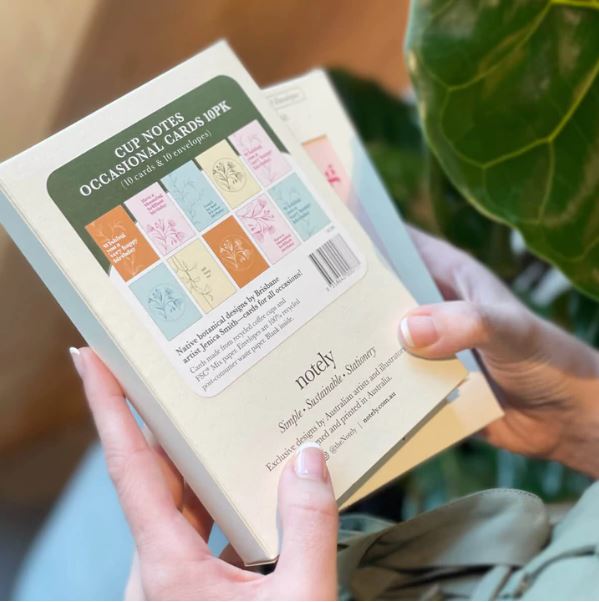
Giles Smith: What I love as well is that you haven't stopped just with recycled pulp. You've looked at the whole customer journey and particularly fulfillment. Tell us a little bit about some of the things you're doing with fulfillment to make that more sustainable.
Jenica Smith: Well, I guess if you were buying a notebook in a shop it's most often wrapped in plastic and our products definitely aren't. So our products are just dispatched with minimal packaging. I have a tiny little card that I'll put into the package with the order, and then they go in a compostable or recycled newspaper satchel. Most of our stockists are more than happy to have the product like that too because they're in mindful shops.
Giles Smith: So you’re then using Sendle to dispatch the orders. Tell us a little bit about that experience. Why did you choose Sendle? What do they do for you that’s say different to say Australia Post?
Jenica Smith: Well, I'm using a mixture of Sendle and Australia post actually, because there is a good chunk of my orders who are rural or express orders that have to go through Australia post. As much as I want to use Sendle because of the carbon neutral courier service, they just do don't have the reach that Australia Post has. But for local stuff around Brisbane, Sendle can deliver same day, which Australia post can’t match. I’ve used Sendle for maybe five or six years now, and I've found the service to be pretty good! Small satchels with Sendle are cheaper than Australia post. So why wouldn't you do that?
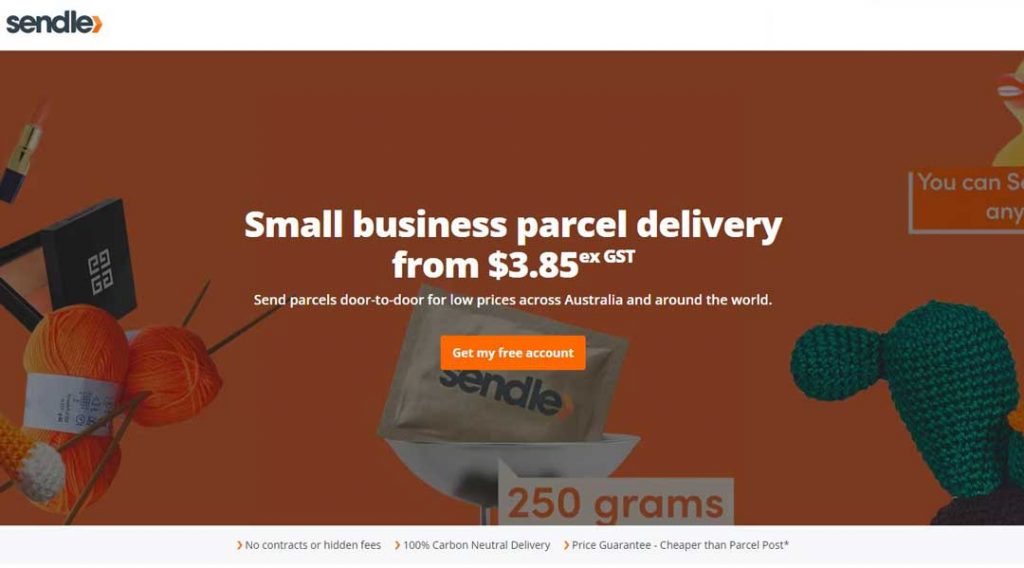
Giles Smith: Makes sense! Cool. So, another thing I love about your overall approach is that you have a very humble, very honest and very transparent view of what your sustainability profile looks like. Tell us a little bit about your approach. Do you get any feedback on it from your customers?
Jenica Smith: I guess I'm just saying how it is. I don't need to kind of fluff it up or change the message. I'm just trying to say I'm here. I'm a small business and I'm trying to be as honest as I can with you. We're making our product here in Brisbane. And I just want to feature these beautiful artists on the covers and in the range. And we want to get it to you with as minimal impact on the environment as possible. Most of our customers are quite mindful of that's our mission and that's what we try to do. They're very happy with our kind of minimalist approach.
Giles Smith: Do you find that you weave those stories through all of your marketing, including in your ads, including in your email marketing?
Jenica Smith: Yes to an extent, but I definitely think I should do it more.
I feel for a lot of years, I have hidden behind the brand a lot. But it's sometimes hard to get out of that bubble and share that story a lot to people.
Giles Smith: In terms of your marketing, in your own words, you've been hiding behind the other artists a little bit. Obviously from a brand growth point of view you do need to be pushing out content. What have you been doing to grow your audience? What’s been working for you?
Jenica Smith: I guess our community on Instagram is quite lovely. I chat to a lot of our stockists and customers through Instagram. A lot of the stockists that do get in touch have found us through social or have heard about our product when searching for our sustainable option. That might've just been through Google or search engines. I guess I probably need to get a lot better with the whole push marketing stuff, but for now a lot of it is organic and through social.
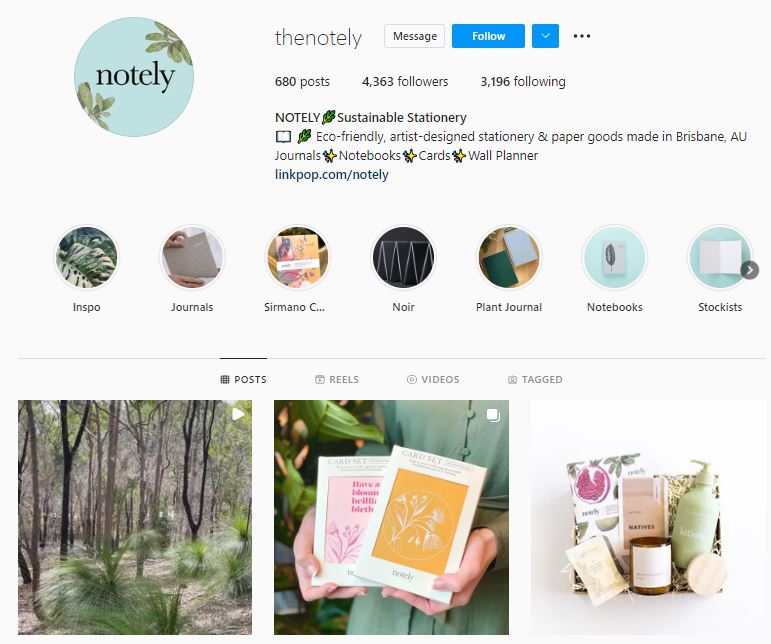
Giles Smith: How often do you go about posting on Instagram? What have you done to make your brand memorable?
Jenica Smith: Early on and even still to this day, my product photos have always been on a really strong turquoise background, mixed in with the forest greens and the minty grains of the products and some of the designs. I think having that quite strong look and feel from the start has really helped people remember the brand. I do have a bit of a love/hate relationship with Instagram to be honest – its hard to find the time to keep posting when there’s so much going on in the business.
Giles Smith: You're not alone! The constant need to generate content can become draining. It's one of the biggest challenges for new brands. So congratulations for keeping it going. Making sure that there's something happening on a frequent basis is very, very important. The AI of all the platforms need regular content. And so, the worst thing that anybody can do is just, just stop and let it all tail off because then you've got to fire up the AI algorithm all over again.
So, in terms of overall marketing, if you look back over the last 8 years, what's been the most successful thing that you've done to generate new audience and new customers?
Jenica Smith: I'd say in the last 12 months, really trying to hone in on my Google ads and get a lot of my digital marketing stuff up to speed.
I've invested in getting my email flows all set up so that if you've been on the site, you get a bit of the brand story sent to your inbox over a few weeks. And I think having that set up is helping to better tell the story.
I also have a couple of tech partners running things like Google campaigns. I’m running our Facebook campaigns in-house. I’ve also joined, an eCom mastermind group. So, I've been able to kind of learn a bit more through that and some of the workshops in the course. Once of the challenges of running a small business with such an eco focus and making everything here locally is that there's just not a huge of profit in the products to be hiring lots of people. And I guess I'm not at a huge revenue to be able to put on lots of staff.
So I have a lot of things to achieve and balance myself.
Giles Smith: Yeah, absolutely. Every single small brand I’ve worked with that is growing organically go through the same pain that you're going through. As a solopreneur doing everything, keeping a million things spinning. Writing content, doing marketing, ordering stock, packing orders. It's just a constant balancing act, isn't it?
So do you have goals set for the next 12 months, next couple of years in terms of how you want to grow the business?
Jenica Smith: Not really, but I would love an offsider. There has some strengths that I don't have & fill the gaps in my skillset. Someone to bounce ideas off really. I think a thing a lot of people in small businesses struggle with is that you don't have that person to just bounce the ideas off when shit hits the fan. Someone to brainstorm with.
That’s one of the great things about my mastermind group. Every fortnight we meet and get to brainstorm issues in our business and say, this has happened or, you know, congratulate each other on the success that you might not get because you kind of plodding along on your own. I think having that comradery with other small business owners who are in the trenches really helps.
Giles Smith: I couldn't agree more. You often hear talk of leadership at the high level being a very lonely place. You're a brilliant example of a typical kind of solopreneur that's building a brand for themselves. That's can be a very lonely place! There are so many things that you need to know and be good at that you cannot possibly be knowing and being good at them all.
So having a community where you can just go and share stories is very powerful for your soul.
Giles Smith: Jenica, this has been a really fascinating and inspiring discussion with you today. I hope everyone that's listening has got a sense of the fact that wherever they are in their own journey, there are other people out there just like them. Just like you, choosing to do things in a sustainable way.
Where can people get hold of your beautiful products?
Jenica Smith: Got to notely.com.au and you can find us on Instagram @thenotely





